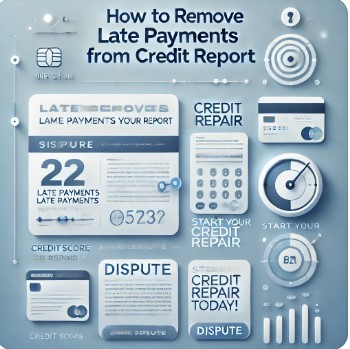Late payments are the kryptonite of a good credit score, and too many of you have been hit hard by them. Learn how to remove late payments from your credit report and improve your score today—it’s time to take action, not just sit around and hope they’ll fade away with time. If you’ve missed a payment or two, you’re probably feeling the sting each time you pull up your credit report. The good news? It’s not a life sentence. You can remove late payments from your credit report or mitigate the damage.
Here’s how to get started:
1. Contact Your Creditor and Request a Goodwill Adjustment
The first step in getting a late payment off your report is simple: ask. If you have a generally good history with your creditor and you’ve missed a payment because of a mistake or financial hardship, they might agree to remove the late payment out of goodwill. This is known as a “goodwill adjustment.”
Here’s How to Do It: Write a heartfelt but concise letter explaining the circumstances that led to the late payment. Mention your positive history with them, your efforts to stay on top of future payments, and why you’re requesting their help. Creditors are more inclined to grant this if they see that the late payment was an isolated incident and you’re back on track.
2. Dispute Inaccurate Late Payments
Too often, there are errors on credit reports that slip under the radar. In fact, a 2021 study by the Consumer Financial Protection Bureau (CFPB) found that roughly 34% of consumers identified at least one error on their credit report. The most common errors include incorrect personal information, outdated account balances, and misreported late payments. If you believe the late payment was reported inaccurately, dispute it directly with the credit bureau. Under the Fair Credit Reporting Act, you have the right to dispute anything you believe is incorrect. The credit bureau must investigate your claim—typically within 30 days.
Here’s How to Do It: Go to the credit bureau’s website (Experian, Equifax, TransUnion) and follow their dispute process online. You’ll want to provide evidence, like proof of payment or bank statements. If the creditor can’t validate the late payment, it must be removed. You can also access all your major credit reports at AnnualCreditReport.com, a reputable resource funded by the major credit agencies and mandated by the U.S. government
3. Negotiate a “Pay for Delete”
If your late payment led to your account going into collections, you might be able to negotiate a “pay for delete” agreement. This is where you agree to pay the overdue amount in exchange for the creditor or collection agency removing the negative entry from your credit report. Understand that creditors are not obligated to agree to this—but it’s worth trying, primarily if the debt has been sold to a collection agency.
Here’s How to Do It: Reach out directly to the creditor or collection agency and discuss the terms. Be clear that payment is contingent on them removing the late payment from your report. Get everything in writing before you pay—don’t rely on verbal agreements here.
4. Automate Payments to Prevent Future Issues
You can’t fix your credit score overnight, but you can prevent future hits by automating your payments. Late payments make up 35% of your FICO score—meaning even one slip can set you back significantly. Setting up automatic payments is the easiest way to make sure this doesn’t happen again.
Here’s How to Do It: Set up recurring payments through your bank account or directly with your creditors. Make sure to also set reminders a few days before your due date so you can verify that the funds are available.
5. Avoid Credit Repair Companies—Reach Out to Reputable Nonprofits Instead
Plenty of credit repair companies advertise their services to remove late payments, but you need to tread carefully here. The truth is that credit repair companies often charge a lot for actions you can take yourself—like disputing errors or negotiating with creditors. Instead, consider reaching out to reputable nonprofit organizations, like Operation HOPE, that provide free or low-cost credit counseling and support. These organizations can guide you through the process of repairing your credit without emptying your wallet.
Here’s How to Do It: Contact a nonprofit agency such as Operation HOPE to get personalized guidance on credit improvement. They can help you create a plan and give you the tools to manage your credit more effectively. Remember, there’s no magic wand; be wary of any service that guarantees quick fixes.
Bottom Line: Take Action Now
You can’t build wealth if your credit profile is dragging you down, and late payments are often one of the biggest barriers. Taking proactive steps to remove late payments from your credit report can help you improve your score, lower your interest rates, and ultimately save you money. Just remember: fixing your credit is a process—not an overnight transformation. Every step you take today gets you closer to financial freedom.
Your credit report is a snapshot of your financial health—it’s time to make sure it’s one you’re proud of.
